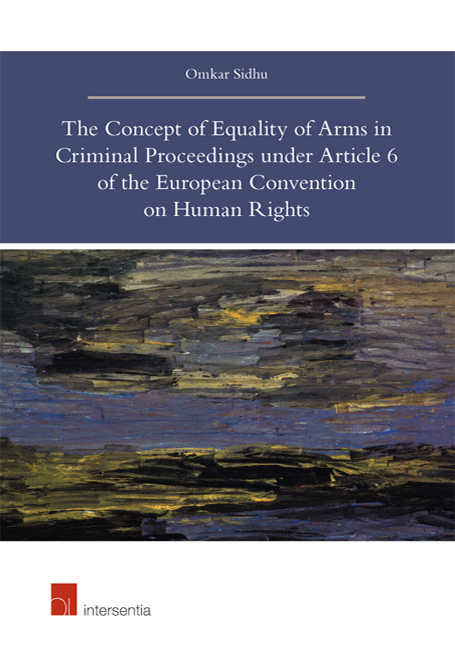Book contents
- Frontmatter
- Contents
- Introduction
- Chapter 1 A Background for Article 6
- Chapter 2 Equality of Arms
- Chapter 3 Equality of Arms and the Right to Challenge and Call Witness Evidence
- Chapter 4 Equality of Arms and the Right to Adequate Time and Facilities
- Chapter 5 Equality of Arms and the Right to Legal Assistance
- Concluding Overview
- Bibliography
- List of Cases
- List of Legislative Instruments
- Frontmatter
- Contents
- Introduction
- Chapter 1 A Background for Article 6
- Chapter 2 Equality of Arms
- Chapter 3 Equality of Arms and the Right to Challenge and Call Witness Evidence
- Chapter 4 Equality of Arms and the Right to Adequate Time and Facilities
- Chapter 5 Equality of Arms and the Right to Legal Assistance
- Concluding Overview
- Bibliography
- List of Cases
- List of Legislative Instruments
Summary
The plight of one subject to a criminal charge is most precarious. His reputation, livelihood and freedom are susceptible to jeopardy as the state pursues the ‘general justifying aim’ of the administration of criminal justice, namely the control of crime which is manifested as detecting, convicting and duly sentencing the guilty. Single-minded attempts to realise this aim would be inconsistent with a civilised society's interest in also ensuring that respect be afforded the interests of those of its members – qua moral agents endowed with autonomy and rationality (dignity) – against whom criminal proceedings are being conducted. Indeed, state failure to afford such respect to its citizens is seriously deleterious to the legitimacy of a process that calls them to answer for alleged criminal wrongdoing. The challenge for the state, therefore, at its most basic level, is to ensure that the practices and procedures applied in its pursuit of crime control are balanced with due respect for the interests of the accused.
It is an expression of this respect that an accused is granted the fundamental right to a fair trial under Article 6 of the European Convention on Human Rights (ECHR), a provision which reflects a commitment to the rule of law. Drawing on the spirit of Hayek's definition, Raz postulates that the rule of law broadly has two aspects: people should be ruled by and obey the law; and the law must be capable of guiding the behaviour of its subjects if it is to be obeyed. Crucially, both aspects require correct application of the law and ‘[o]pen and fair hearing, absence of bias and the like’ is essential if confidence is to be had that this has been carried out. Upholding the rule of law through fair trial also implies respect for the dignity of citizens since the state is constrained from exercising arbitrary or oppressive power. In constraining the scope and manner of exercise of state power, the rule of law is an integral element of democratic governance. Accordingly, the right to a fair trial is also acknowledged as holding a prominent place in a democratic society.
- Type
- Chapter
- Information
- Publisher: IntersentiaPrint publication year: 2017

